英语文体学The English of Public Speaking
The art of public speaking.pptx

Culture and Language Considerations
01
Cultural Norms
Be aware of any cultural norms or tables that might affect your audience's reception of your message Avoid offering language or topics that might be considered taboo
Appropriate Delivery
Appropriate delivery involves speaking at an appropriate space, using modulation in volume and pitch, and maintaining eye contact with the audience The speaker should also vary their tone and space to keep the audience engaged
03
Engaging Content
Engaging content keeps the audience interested and involved It should be relevant, interesting, and tailed to the target audience
Elements of a Good Speech
Demographics and Psychology
Occupational Backgrounds Understanding your audience's expertise can help you connect with them on a personal level and provide relevant examples from their industry
英语文体学 Chapter The English of Public Speech

8.3 General Features of Public Speech
Public speaking shows the characteristics of the written mode
English Stylistics
Chapter 8 The English of Public Speech
WANG Yao @ SDUT
Contents
8.1 Scope of Public Speech 8.2 A Sample Text for Analysis 8.3 General Features of Public
So under the heading of public speech, we shall mainly discuss persuasive speeches.
8.2 A Sample Text for Analysis
Winston Churchill on May 13, 1940 in the House of Commons
So far as the personal tenor is concerned, the 1) kind of speeches can be formal or less formal or informal; the 2) kind is mostly formal, and the 3) kind varies in degree of formality.
Public speaking is also different from daily conversation
It concentrates on one topic with highly structured format and more formal language, and makes a more effective way of delivery.
英语文体学-Chapter-7-The-English-of-Conversation

Chapter 7 The English of Conversation
WANG Yao @ SDUT
Contents
7.1 Necessity of Studying Speech 7.3 Object of Study 7.5 A Sample Text of Casual
4) Simple nominal and verbal group structure
Nominal groups tend to be “Det+(Adj)+Noun”; with not much postmodification or adjective sequence
Relative clauses omit an optional relative pronoun and the prep. is put at the end
Saussure emphasized speech over writing
Language is a system of arbitrary vocal symbols used for human communication
People talk and they communicate their thoughts and feelings by means of oral sounds.
A teacher, for instance, will talk with his wife at home, with his colleagues at school, with his students in the classroom, with shop assistants when shopping, with friends on the phone, etc. He is likely to engage in monologue as well
作文The power of public speaking
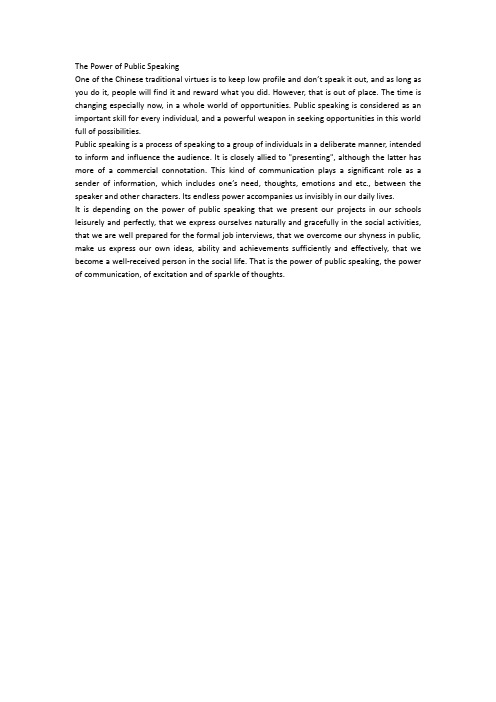
The Power of Public SpeakingOne of the Chinese traditional virtues is to keep low profile and don’t speak it out, and as long as you do it, people will find it and reward what you did. However, that is out of place. The time is changing especially now, in a whole world of opportunities. Public speaking is considered as an important skill for every individual, and a powerful weapon in seeking opportunities in this world full of possibilities.Public speaking is a process of speaking to a group of individuals in a deliberate manner, intended to inform and influence the audience. It is closely allied to "presenting", although the latter has more of a commercial connotation. This kind of communication plays a significant role as a sender of information, which includes one’s need, thoughts, emotions and etc., between the speaker and other characters. Its endless power accompanies us invisibly in our daily lives.It is depending on the power of public speaking that we present our projects in our schools leisurely and perfectly, that we express ourselves naturally and gracefully in the social activities, that we are well prepared for the formal job interviews, that we overcome our shyness in public, make us express our own ideas, ability and achievements sufficiently and effectively, that we become a well-received person in the social life. That is the power of public speaking, the power of communication, of excitation and of sparkle of thoughts.。
The Art of Public Speaking
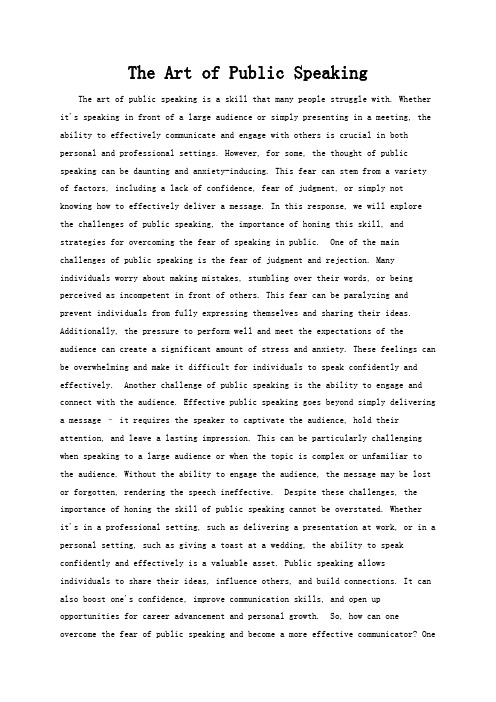
The Art of Public Speaking The art of public speaking is a skill that many people struggle with. Whether it's speaking in front of a large audience or simply presenting in a meeting, the ability to effectively communicate and engage with others is crucial in both personal and professional settings. However, for some, the thought of public speaking can be daunting and anxiety-inducing. This fear can stem from a variety of factors, including a lack of confidence, fear of judgment, or simply not knowing how to effectively deliver a message. In this response, we will explore the challenges of public speaking, the importance of honing this skill, and strategies for overcoming the fear of speaking in public. One of the main challenges of public speaking is the fear of judgment and rejection. Many individuals worry about making mistakes, stumbling over their words, or being perceived as incompetent in front of others. This fear can be paralyzing and prevent individuals from fully expressing themselves and sharing their ideas. Additionally, the pressure to perform well and meet the expectations of the audience can create a significant amount of stress and anxiety. These feelings can be overwhelming and make it difficult for individuals to speak confidently and effectively. Another challenge of public speaking is the ability to engage and connect with the audience. Effective public speaking goes beyond simply delivering a message – it requires the speaker to captivate the audience, hold their attention, and leave a lasting impression. This can be particularly challenging when speaking to a large audience or when the topic is complex or unfamiliar to the audience. Without the ability to engage the audience, the message may be lost or forgotten, rendering the speech ineffective. Despite these challenges, the importance of honing the skill of public speaking cannot be overstated. Whetherit's in a professional setting, such as delivering a presentation at work, or in a personal setting, such as giving a toast at a wedding, the ability to speak confidently and effectively is a valuable asset. Public speaking allowsindividuals to share their ideas, influence others, and build connections. It can also boost one's confidence, improve communication skills, and open up opportunities for career advancement and personal growth. So, how can one overcome the fear of public speaking and become a more effective communicator? Onestrategy is to practice and prepare thoroughly. By rehearsing the speech multiple times, the speaker can become more familiar with the content and delivery, which can help alleviate anxiety and build confidence. Additionally, seeking feedback from trusted individuals can provide valuable insights and help improve theoverall delivery of the speech. Another strategy is to focus on the message and the audience rather than on oneself. By shifting the focus away from personal insecurities and onto the value of the message being delivered, the speaker canfeel more purposeful and connected to the audience. This can help reduce self-consciousness and increase the speaker's ability to engage with the audience. Furthermore, utilizing visual aids and storytelling techniques can help enhancethe delivery of the speech and make it more engaging for the audience. Visual aids, such as slides or props, can help reinforce key points and keep the audience visually engaged. Meanwhile, storytelling can create a more personal and relatable experience for the audience, making the message more memorable and impactful. In conclusion, the art of public speaking is a valuable skill that can greatlybenefit individuals in both their personal and professional lives. While the fear of public speaking can be daunting, it is not insurmountable. By acknowledging and addressing the challenges, and implementing strategies to overcome them,individuals can become more confident and effective communicators. With practice, preparation, and a focus on engaging the audience, anyone can improve their public speaking skills and become a more impactful and influential speaker.。
9-The-art-of-public-Speaking-公共演讲的艺术
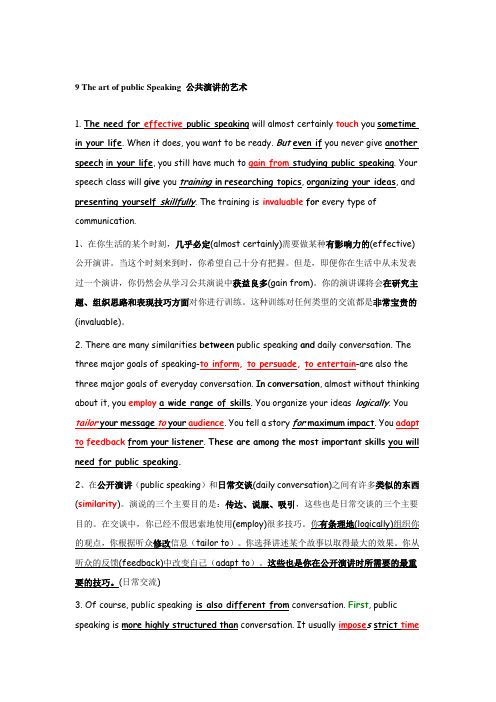
9 The art of public Speaking 公共演讲的艺术1. The need for effective public speaking will almost certainly touch you sometime in your life. When it does, you want to be ready. But even if you never give another speech i n your life, you still have much to gain from studying public speaking. Your speech class will give you training in researching topics, organizing your ideas, and presenting yourself skillfully. The training is invaluable for every type of communication.1、在你生活的某个时刻,几乎必定(almost certainly)需要做某种有影响力的(effective)公开演讲。
当这个时刻来到时,你希望自己十分有把握。
但是,即便你在生活中从未发表过一个演讲,你仍然会从学习公共演说中获益良多(gain from)。
你的演讲课将会在研究主题、组织思路和表现技巧方面对你进行训练。
这种训练对任何类型的交流都是非常宝贵的(invaluable)。
2. There are many similarities between public speaking and daily conversation. The three major goals of speaking-to inform, to persuade, to entertain-are also the three major goals of everyday conversation. In conversation, almost without thinking about it, you employ a wide range of skills. You organize your ideas logically. You tailor your message to your audience. You tell a story for maximum impact. You adapt to feedback from your listener. These are among the most important skills you will need for public speaking.2、在公开演讲(public speaking)和日常交谈(daily conversation)之间有许多类似的东西(similarity)。
英语文体学Chapter8TheEnglishofPublicSpeech

8.4.1.3 More complex-looking group structures
Nominal groups can be complexlooking with postmodification to be accurate and easy to process
of phrase, relative clause (relative pronoun not omitted) (p.126)
8.3 General Features of Public Speech
Public speaking shows the characteristics of the written mode
Its highly logical organization of thoughts, closely-knit structure and formal language.
Verbal groups
lack of contractions, passive structures
8.4.2 Lexical Features
8.4.2.1 Using accurate and clear word In order to be accurate and clear in
So far as the personal tenor is concerned, the 1) kind of speeches can be formal or less formal or informal; the 2) kind is mostly formal, and the 3) kind varies in degree of formality.
8.4.2 Lexical Features
英语文体学The pulic Speech终极版

The definition of the public speech The components of the public speech The types of the public speech The ways of delivery The features of the public speech
The ways of delivery
•Reading from a manuscript •Reciting from memory •Impromptu speaking •Extemporaneous speaking
Adventages:
R 1.ensure precise wording,
3. Entertaining speech
Aim: interest, entertain, amuse. Types: party, after dinner
4. Stimulate speech
Aim: stimulate, impress. Types: memorial services, inauguration ceremonies.
language
I mI
Adventages:
1.Indicate speaker's confidence and knowlege.
p m 2.Catche the audience's attention
rp
or mo pm
Disadventage:
The speaker should keep to one or two points. Sometimes, they may
文体学

• 定义3: David Crystal • Investigating English Style • There are four commonly occurring senses of the term STYLE: • 1)some or all the language habits(i.e. speech and writing habits) of one person: Shakespeare, James Joyce, Hemingway.
• Familiarize yourself with different figures of speech, such as • oxymoron, paradox, synecdoche, metonymy, metaphor, irony, ambiguity, over/understatement, alliteration, rhyme, assonace, consonace, onomatopoeia, repetition, parallelism etc.
• • • • • • • •
Part Four: Some Practical Varieties 1. Coversation 2. Public speaking 3. English for Science and Technology 4. Journalese 5. Advertising 6. Literary English 7. Legal documents
• • • • •
Part Three: Situational Varieties 1 Varieties in relation to regions 2 Varieties in relation to media 3 Varieties in relation to attitude 4 Varieties in relation to social factors
英语文体学-Chapter-8-The-English-of-Public-Speech

8.4.1 Grammatical Features
8.4.1.1 Variation in sentence length Its sentences vary much in length.
meaning, successful speakers tend to choose concrete, familiar words Even when abstract or unfamiliar words, such as technical terms, are unavoidable, the speaker is supposed to keep them to a minimum and clearly define them. There are generally no words vague in meaning.
8.1 Scope of Public Speech
So far as the mode is concerned, there are impromptu speeches (speeches made on the spot), extemporaneous speeches (speeches with a set of brief notes or an outline to jog the memory), speeches from reciting, and speeches from a manuscript; but many of the speeches are written to be spoken before an audience.
The Art of Public Speaking —第十三单元
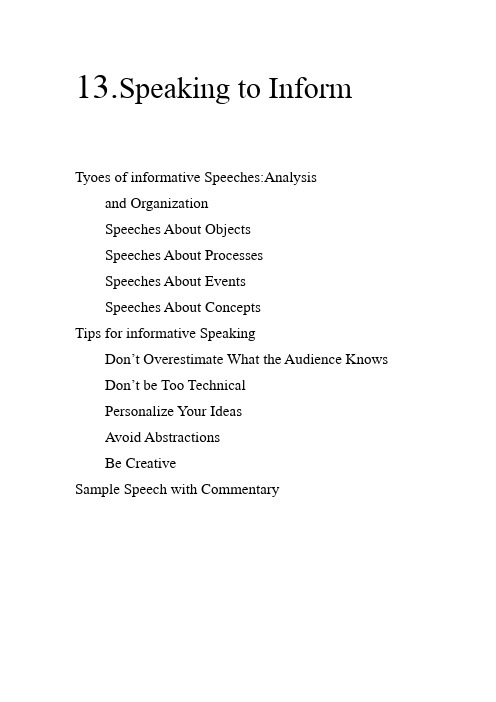
13.Speaking to InformTyoes of informative Speeches:Analysisand OrganizationSpeeches About ObjectsSpeeches About ProcessesSpeeches About EventsSpeeches About ConceptsTips for informative SpeakingDon’t Overestimate What the Audience Knows Don’t be Too TechnicalPersonalize Your IdeasAvoid AbstractionsBe CreativeSample Speech with CommentaryPublic speaking to inform occurs in a wide range of everyday situation: the business manager explaining next year’s budget; the architect reviewing plans for a new building; the tour guide showing historical sites; the scientist presenting a paper at a conference; the teacher in a classroom. There are endless situation in which people need to inform others.In one survey, college student were asked to rank the speech skills most important to their jobs. They ranked informative speaking number one. In another survey, 62 percent of responders said they used informative speaking “almost constantly,” competence in this form of communication will be valuable throughout your life.When you speak to inform, your aim is to convey knowledge and understanding ----not to advocate a cause. Your speech will be judged in light of three general criteria:Is the information communicated accurately?Is the information communicated clearly?Is the information made meaningful and interesting to audience?In this chapter, we will look at four types of informative speeches and the basic principles of informative speaking. Along the way, we will apply various general principles discussed in previous chapters.Types of iInformative Speeches: Analysis and Organization There are many ways to classify informative speeches, here we focus onspeeches about objects, speeches about processes, speeches about events, and speeches about concepts.SPEECHES ABOUT OBJECTSAs the word is used here, “object” include everything that is visible, tangible, and stable in form. Objects may have moving parts or be alive; they may include places, structures, animals, even people. Here are examples for speeches about objects:Gobi Desert computersStock market Sichuan masksXiang embroidery pandaYou will not have enough time to tell your classmates everything about any of these subjects. Instead, you will choose a specific purpose that focuses on one aspect of your subject. Working from the topics presented above, the following are examples of specific purpose statement for informative speeches about objects:To inform my audience about geological features of Gobi Desert.To inform my audience about the latest developments in computer technology.To inform my audience about the craftsmanship of Xiang embroidery.Notice how precise these statements are. As we saw in Chapter 4, you should select a specific purpose that is not too broad to achieve in the allotted time. “To inform my audience about Zhang Mengfu” is far toogeneral for a classroom speech. “To inform my audience about Zhang Mengfu’s contributions to landscape painting” is more precise and is a purpose you could reasonably hope to achieve in a brief talk.If your specific purpose is to explain the history or evolution of your subject, you will put your speech in chronological order. For example: Specific purpose: To inform my audience about the poetic career of DuFu.Central idea: Judged by some experts to be the world’s greatest poet,Du Fu expressed the people’s spirit during atumultuous period in Chinese history.Main point: I. Du Fu was greatly influenced by his friendship withLi Bai during the 740s.II.Du Fu blossomed as a poet during the 750s despitegreat turmoil in his personal life.III.Du Fu reached a peak of creativity during his yearsin Chengdu from 759 to 765.IV.Du Fu contributed to write works of lastingimportance until his death in 770.If your specific purpose is to describe the main features of your subject, you may organize your speech in spatial order:Specific purpose: To inform my audience about the design of the EiffelTower.Central idea: The Eiffel Tower is divided into three sections, eachwith its own functions.Main point: I. The lowest section of the tower contains the entrance,a gift shop, and a restaurant.II.The middle section of the tower consists of stairs andelevators that lead to the top.III.The top section of the tower includes an observationdeck with a spectacular view of Paris.As often as not, you will find that speeches about objects fall into topical order. For example:Specific purpose: To inform my audience about the four majorelements of a Japanese garden.Central Idea: The four mahor elements of a Japanese gardenare stones,sand,water, and plants.Main Points: Ⅰ.The first element of a Japanese garden isstones,which symbolizes the sea or other vastareas.Ⅱ.The second element of a Japanese garden issand, which symbolizes the sea or other vastareas.Ⅲ. The third element of a Japanese garden iswater,which symbolizes cleansing andpurity.Ⅳ.The fourth element of a Japanese garden isplants,which symbolizes life and thechant:ing seasons.No matter which organizational method you use-chronological, spatial, or topical-be sure to follow the guidelines discussed in Chapter 7: (1) limit the number of main points; (2) keep main points separate; (3) try to use the same pattern of wording for all main points; (4) balance the amount of time devoted to each main point.SPEECHES ABOUT PROCESSESA process k a systematic series of actions that leads to a specific result or product. Speeches about processes explain how something is made, how something is done, or how something works. Here are examples of specific purpose statements for speeches about processes: To inform my audience how typhoons developTo mform my audience how to wnte an effective job resumeTo inform my audience how to perform Tai ChiAs these examples suggest. there are two kinds of informative speeches ahout processes. One kind explains a process so that listeners will understand it better .Your goal is to have your audience know the steps of the process and how tbey relate to one another. if your specific purpose is "To inform my audience how nuclear, power plants work," youwill explain the basic structure and mechanisms of a nuclear power plant.You will not instruct your listeners on how they can operate a nuclear power plant.A second kind of speech explains a process so listeners will be better able to perform the process themselves .Your goal in this kind of speech is to have the audience learn a skill .Suppose your specific purpose is "To inform my audience how to take pictures like a professional photographer.” You will present photographic techniques and you’re your listeners how they can use them.Both kmds of speeches about processes may require visual aids. At the very least, you should prepare a chart outlining the steps or techniques of your process in some cases you will need to demonstrate the steps or techniques by performing them in front of your audience. (If you are using visual aids of any kind, be sure to review Chapter 12.)When informing about a process. you will usually arrange your speech in chronological order, explaining the process step by step from beginning to end. For example:Specific Purpose: To inform my audience about the major rituals of a traditional Bengali wedding in India.Centrai idea: A traditional Bengali wedding consists of series of rituals that take place before, during, and after the wedding ceremony. Main Poins: Ⅰ.Pre-wedding rituals include giving gifts to thebride and groom and dressing the bride intraditional fashion.Ⅱ.Rituals during the ceremony include an exchangeof garlands between the bride and groom, thechannng of mantras, and the giving away of thebride by her uncle.Ⅲ.Post-wedding rituals a celebration at the homeof the bride’s family, a reception at the home ofmantras,and the formal exit of the bride andgroom.Sometimes, rather than moving through a process step by step, you will focus on the major principles or techniques involved in performing the process. Then you will organize your speech in topical order. Each main point will deal with a separate principle or technique. For example: Specific Purpose: To inform my audience of the common methods usedby stage magicians to perform their tricks.Central idcra: Stage magicians use two common metheds to performtheir tricks-mechanical devices and sleight of hand. Main Points: Ⅰ.Many magic tricks rely on mechanical devices thatmay require little ,skill by the magician.Ⅱ.Other magic tricks depend on the magician’s skill infooling people by sleight-of-hand manipulationConcise organization is especially important in speeches about processes. You must make sure each step is clear and easy to follow. If your process has more than four or five steps, group the steps into units to limit the number of main pointsSPEECHES ABOUT EVENTSThe Random House Dictionary defines an event as “anything that happens or is regarded as happening.”By this definition, the following are examples of suitable subjects for informative speeches about events: insomnia(失眠) marriageWorld Cup Battle of Red Cliffs(赤壁之战)tsunami(海啸) cyber crime(网络犯罪) As usual, you will need to narrow your focus and pick a specific purpose you can accomplish in the allotted(分配的) time. Here are examples of specific purpose statements for informative speeches about events:To inform my audience about healthy cures for insomniaTo inform my audience about events at the Battle of Red CliffsTo inform my audience about the major types of cyber crimeThere are many ways to discuss events. If your specific purpose is to recount the history of an event, you will organize your speech in chronological(按时间顺序) order, relating the incidents one after another in the order they occurred. For example:Specific Purpose: To inform my audience about the history of theParalympics(残奥会,原为脊髓病患者举办的运动会)Central Idea: Olympic-style games for athletes with physicaldisabilities have made great strides(进步) since thefirst competition more than 60 years ago.Main Points: Ⅰ. What would eventually become the Paralympicsbegan in 1948 with a sports competition in GreatBritain involving World War Ⅱveterans(退伍军人) with spinal cord(脊髓) injuries.Ⅱ. In 1952, the event expanded when athletes fromthe Netherlands(荷兰) took part.Ⅲ. The first official Paralympic Games forinternational athletes took place in Rome in1960.Ⅳ. In 2001, an agreement was signed officiallyholding the Paralympic Games alongside thesummer and winter Olympic Games.You can approach an event from almost any angle or combination of angles-features, origins, implications, benefits, future development, and so forth. In such cases, you will put your speech together in topical order, making sure that your main points subdivide(细分) the subjectlogically(合乎逻辑地) and consistently(一致地). For instance:Specific Purpose: To inform my audience about the four roles in PekingOpera.Central Idea: The four major roles in Peking Opera are Sheng, Dan,Jing, and Chou.Main Point: Ⅰ. Sheng is the primary male role.Ⅱ. Dan refers to any female role.Ⅲ. Jing is a painted-face male role.Ⅳ. Chou is a male clown role.SPEECHES ABOUT CONCEPTSConcepts include beliefs, theories, ideas, principles, and the like. They are more abstract than objects, processes, or events. The following are examples of subjects for speeches about concepts:Neo-Confucianism(新儒家思想) theories of evolutionPhilosophies of education motivational principles(激励原则) Military theory constitutionalism(立宪)Taking a few of these general subjects, here are some specific purpose statements for speeches about concepts:To inform my audience about basic points of the SMART principle To inform my audience about difference philosophies of education in China and the United StatesTo inform my audience about major theories explaining theextinction of dinosaurs(恐龙)Speeches about concepts are usually organized in topical order and focus on the main features or aspects of your concept. For example: Specific Purpose: To inform my audience about the Five Principles ofPeaceful Coexistence.(和平共处五项原则)Central Idea: The Five Principles of Peaceful Coexistence set forthnorms for relations among nations.Main Points: Ⅰ. The first principle is mutual respect for sovereigntyand territorial integrity.Ⅱ. The second principle is mutual non-aggression.Ⅲ. The third principle is non-interference in eachother’s internal affairs.Ⅳ. The fourth principle is equality and mutual benefit.Ⅴ. The fifth principle is peaceful coexistence.Another approach is to explain competing schools of thought about the same subject. For example:Specific Purpose: To inform my audience of arguments for and againstOlympic Math(奥林匹克数学)Central Idea: Supporters and opponents of Olympic Math both havelegitimate(合理的) arguments.Main Points: Ⅰ. Supporters of Olympic Math argue that it developsdiscipline, promotes math skills, and is necessary foradmission to top middle schools.Ⅱ. Opponents of Olympic Math argue that it is suitablefor only a few students, damages self-confidence inmost, and destroys future interest in math for many.Speeches about concepts are often more complex than other kinds of informative speeches. When dealing with concepts, pay special attention to avoiding technical language, to defining terms clearly, and to using examples and comparisons to illustrate the concepts.The lines dividing speeches about objects, processes, events, and concepts are not absolute. Some subjects could fit into more than one category, depending on how you develop the speech. For example, a speech about the life of Yan Fu would treat its subject as an object, while a speech about Yan Fu’s theory of translation would most likely treat its subject as a concept. The important step is to decide whether you will handle your subject as an object, a process, an event, or a concept. Once you do that, you can develop the speech accordingly.Tips for Informative SpeakingAll the previous chapters of this book relate to the principles of informative speaking. Selecting a topic and specific purpose, analyzing the audience, choosing supporting materials, organizing the speech, using language, delivering the speech—all must be done effectively if an informative speech is to be a success. Here we emphasize five additional points thatwill help make yours a success.DON'T OVERESTIMATE WHAT THE AUDIENCE KNOWSIn a talk about meteorology, a speaker said, “The effects of the Bhola cyclone would have been reduced if better warning and response systems had been in place at the time.” Then he was off to other matters, leaving his listeners to puzzle over what the Bhola cyclone was, when it happened, and what kind of destruction it wreaked.The speaker assumed that the audience already knew these things. But his listeners were not experts on meteorology. Even those who had heard of the Bhola cyclone had only a fuzzy notion of it. Only the speaker knew that the cyclone, which killed 500000 people when it struck East Pakistan (now Bangladesh) on November 12, 1970, is among the deadliest natural disasters in modern history.As many speakers have discovered, it is easy to overestimate the audience's stock of information. In most informative speeches, your listeners will be only vaguely knowledgeable (at best) about the details of your topic. You cannot assume that they will know what you mean. Rather, you must lead them step by step, without any shortcuts. Be sure to define every special term, clarify every idea, illustrate every concept.DON’T BE TOO TECHNICALWhat does it mean to say an informative speech is too technical? It may mean the subject matter is too specialized for the audience. Any subject can bepopularized—but only up to a point. The important thing for a speaker to know is what can be explained to an audience of nonspecialists and what cannot.Suppose your subject is electronic amplifiers. It's no trick to demonstrate how to operate an amplifier (how to turn it on and off, adjust the volume, set the tone and balance controls). It's also relatively easy to explain what an amplifier does (it boosts the sound received from a radio, MP3 player, or live performance). But to give a full scientific account of how an amplifier works—that is another matter. It cannot be done in any reasonable time unless the audience knows the principles of audio technology. The material is too technical to be understood by a general audience.Even when the subject matter is not technical, the language used to explain it may be. Every activity has its jargon, whether it be ballet (arabesque, jete, pas de deux), chemistry (colloid, glycogen, heavy water), or financial analysis (covered call, reverse bid, toehold acquisition). If you are talking to a group of specialists, you can use technical words and be understood. But you must do all you can to avoid technical words when informing an audience of nonspecialists. PERSONALIZE YOUR IDEASListeners want to be entertained as they are being enlightened. Nothing takes the edge off an informative speech more than an unbroken string of facts and figures. And nothing enlivens an informative speech more than personal illustrations . Whenever possible, you should try to personalize your ideas and dramatize them in human terms.Start right at the beginning. Instead of saying,I want to talk with you about chili peppers.You could say:Imagine your mouth burning like wildfire,your eyes squirting out uncontrollable tears, and your face red and sweating profusely. Are you sick? No.you just took a bite of a screaming hot chili pepper. You’re partaking in a worldwide tradition that has been spicing up lives and diets for thousands of yeas.But don’t stop with the introduction. W henever you can, work in examples that will put a human face on your topic while at the same time illustrating your ideas. Find ways to connect the speech with your listeners’ interests and concerns.Even words such as “your” and “your,” “we”and “our”, can make a big difference. Research shows that using these kinds of personal terms in an informative speech significantly increases the audience’s understanding of a speaker’s ideas.A VOID ABSTRACTIONSAbstract ideas are less compelling to listeners than are concrete ideas. One way to avoid abstractions is through description. Here is how one speaker described his feelings the first time he went sky diving: As I jump out of the plane , I wonder, “what am I doing here?” The blast of air blows me backward like a leaf in the autumn wind. In 10seconds , my body levels out and accelerates to a speed of 190 kilometers an hour. The air supports my body like an invisible flying carpet. Every nerve in my body is alive with sensation; yet I am overcome by a peaceful feeling that I am at one with the sky.As we listen to the speaker,we feel his exhilaration as he floats effortlessly through the sky. The vivid description draws us in.Another way to escape abstractions is with comparison and/or contrast. Both provide a way to put your subject in concrete, familiar terms. For example, suppose you want to convey what would happen if a comet or large asteroid struck the earth. You could say this: If a comet or large asteroid struck the earth, the impact would be devastating.True,but the statement is vague and abstract. Now suppose you add this:To give you an idea how devastating the impact would be, it would be like all the nuclear bombs in the world going off at one spot.The comparison, makes the abstract specific by relating it to something we know.BE CREATIVEWhether you are seeking alternatives to technical language, avoiding abstractions, personalizing your ideas, or adapting to the audience’s knowledge about the topic,you need to be creative in thinking about waysto achieve your objectives. A good informative speech is not an oral encyclopedia article. Like any other kind of speech, it requires a healthy dose of creativity.If you look back at the examples discussed on the previous few pages, you will see that all of them involve creative thinking by the speaker. For one last example, we can turn to a speech about extended- wear contact lenses. The speech was given when such lenses first came on the market. Because the lenses were too small for his audience to see, the speaker used a glass plate, a paper plate, and a sheet of clear plastic wrap to illustrate how extended-wear lenses differ in flexibility from other kinds of contact lenses. As you can see from Video 13.2, it was a highly effective-and creative-solution.If, like this speaker, you think creatively when constructing your informative speeches,you are much more likely to be successful.Sample Speech with Commentary The following speech provides an excellent example of how to apply the tips for informative speaking discussed in this chapter.Pay attention to how crisply the speech is organized; to how the speaker uses clear,nontechnical language;and to how skillfully she demonstrates yoga postures as she explains them.SUMMARYInformation speeches may be grouped into four categories:speeches about objects,processes,events,and concepts.Objects include place,structures,animals,even people. Speechesabout objects usually are organized in chronogical,spatial,or topical order.A process is a series of actions that work together to produce a final result. Speeches about processes explain haw something is made, how something is done,or how something works.The most common types of organazation for speeches about processes are chronological and topic.An event is anying that happens or is regarded as happening. Speeches about events sre usually arranged in chronological or topical order. Concepts include beliefs,theories, ideas, and principles. Speech about concepts are often more complex than other kinds of informative speeches,and they typically follow a topical pattern of organization.No matter what the subject of your information speech,there are several tips you can follow to make it successful.First,don’t overestimate what your audience knows about the topic.Second,avoid being overly technical.Third,personalize your ideas and illustrate them in human terms.Fourth,use description,comparision,and contrast to make your ideas concrete rather than abstract.Fifth,be creative in finding ways to communicate your ideas as engagingly as possible.。
英语文体学The English of Public Speaking

13. make no mistake
7. land of liberty
14. favors freedom
15. the pain of poverty
Lexical Features
The employment of big words The employment of noun phrases where verb phrases
may be used in other variety First person pronouns Avoidance of non-standard words and expression
Hard words
Items I Have a Dream The Inaugural Address Total
97 / 62.6%
139 / 77.2%
Simple past
10 / 6.5%
10 / 5.6%
Future indefinite
30 / 19.4%
23 / 12.8%
Present perfect
13 / 8.4%
6 / 3.3%
Present continuous Past continuous
They are impromptu[ɪm'prɒmptju:] speeches, extemporaneous[eks'tempə'reɪnɪəs] speeches, speeches from reciting, speeches from manuscript, but many of the speeches are written to be spoken before an audience.
英语公共演讲
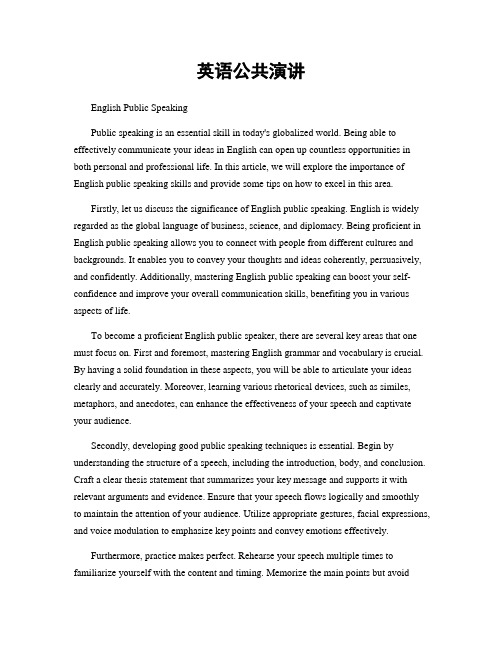
英语公共演讲English Public SpeakingPublic speaking is an essential skill in today's globalized world. Being able to effectively communicate your ideas in English can open up countless opportunities in both personal and professional life. In this article, we will explore the importance of English public speaking skills and provide some tips on how to excel in this area.Firstly, let us discuss the significance of English public speaking. English is widely regarded as the global language of business, science, and diplomacy. Being proficient in English public speaking allows you to connect with people from different cultures and backgrounds. It enables you to convey your thoughts and ideas coherently, persuasively, and confidently. Additionally, mastering English public speaking can boost your self-confidence and improve your overall communication skills, benefiting you in various aspects of life.To become a proficient English public speaker, there are several key areas that one must focus on. First and foremost, mastering English grammar and vocabulary is crucial. By having a solid foundation in these aspects, you will be able to articulate your ideas clearly and accurately. Moreover, learning various rhetorical devices, such as similes, metaphors, and anecdotes, can enhance the effectiveness of your speech and captivate your audience.Secondly, developing good public speaking techniques is essential. Begin by understanding the structure of a speech, including the introduction, body, and conclusion. Craft a clear thesis statement that summarizes your key message and supports it with relevant arguments and evidence. Ensure that your speech flows logically and smoothlyto maintain the attention of your audience. Utilize appropriate gestures, facial expressions, and voice modulation to emphasize key points and convey emotions effectively.Furthermore, practice makes perfect. Rehearse your speech multiple times to familiarize yourself with the content and timing. Memorize the main points but avoidsounding mechanical or robotic. Instead, aim for a natural and conversational delivery. Practice in front of a mirror or record yourself to identify areas for improvement. Additionally, consider joining a public speaking club or participating in competitions to gain experience and receive constructive feedback.In addition to technical skills, developing strong interpersonal skills is crucial in English public speaking. Engage with your audience by making eye contact and creating a friendly atmosphere. Consider their cultural background and adapt your language and content accordingly. Be open to questions, comments, and feedback, and respond graciously. Connecting with your audience on an emotional level can greatly enhance the impact of your speech and leave a lasting impression.Lastly, continuous learning and improvement are essential. Stay updated on current affairs, global trends, and relevant topics to ensure that your speeches remain insightful and relevant. Seek feedback from mentors, friends, or colleagues to identify areas for growth and work on them. Attend workshops or seminars on public speaking and learn from successful speakers. Embrace opportunities to speak in public and step out of your comfort zone.In conclusion, English public speaking is a vital skill for individuals who aspire to excel in an interconnected world. By mastering this skill, you can effectively communicate across cultures, enhance your overall communication skills, and boost your confidence. Focus on mastering English grammar and vocabulary, refine public speaking techniques, practice diligently, develop interpersonal skills, and embrace continuous improvement. Remember, the journey to becoming an excellent English public speaker may be challenging, but the rewards far outweigh the effort.。
关于公共演讲英语作文
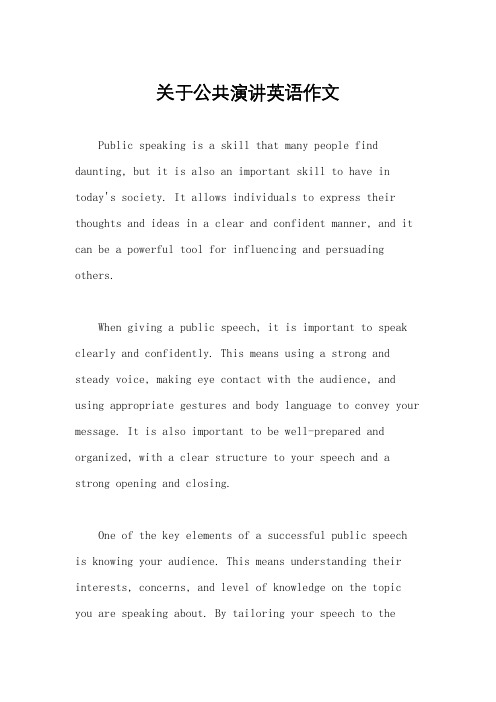
关于公共演讲英语作文Public speaking is a skill that many people find daunting, but it is also an important skill to have in today's society. It allows individuals to express their thoughts and ideas in a clear and confident manner, and it can be a powerful tool for influencing and persuading others.When giving a public speech, it is important to speak clearly and confidently. This means using a strong and steady voice, making eye contact with the audience, and using appropriate gestures and body language to convey your message. It is also important to be well-prepared and organized, with a clear structure to your speech and a strong opening and closing.One of the key elements of a successful public speechis knowing your audience. This means understanding their interests, concerns, and level of knowledge on the topic you are speaking about. By tailoring your speech to theneeds and interests of your audience, you can ensure that your message resonates with them and has a greater impact.Another important aspect of public speaking is being able to think on your feet. This means being able to respond to unexpected questions or challenges from the audience, and being able to adapt your speech in real-time if necessary. This requires quick thinking, confidence, and the ability to stay calm under pressure.In conclusion, public speaking is an important skill that can have a significant impact on your personal and professional life. By speaking clearly and confidently, understanding your audience, and being able to think on your feet, you can become a more effective and influential speaker. So, don't be afraid to step out of your comfort zone and practice your public speaking skills whenever you get the chance.。
The Art of English Public Speaking

优秀演讲者应该具备的特点:
clarity (口齿清晰) , fluency (语言流 畅),accuracy and elegance (发音 准确,优美), natural tone (语调自 然) ,pace (节奏变化), pause (注 意停顿), facial expression(面部表 情),eye contact(眼神交流), gestures and postures (手势姿势), use of rhetoric(修辞技巧的运用), genuine emotion(情感真挚)。
例如:I stand here today humbled by the task before us, grateful for the trust you have bestowed, mindful of the sacrifices borne by our ancestors. I thank President Bush for his service to our nation, as well as the generation and cooperation he has shown throughout this transition.
The Art of English Public Speaking
英语演讲艺术
一.The Classifications of Public Speaking (演讲的分类)
1.Required ﹠Prepared Speeches (命题/定 题演讲) 特点:specific purpose 主题鲜明 identical theme 针对性强 definite content 内容稳定 complete structure 结构完整 2.Impromptu Speeches (即兴演讲) 要求:keep to the point 紧扣主题 be coherent 注意条理 organize ideas promptly 迅速组合 be brief 言简意赅
英语文体学第7章口语与书面语

❖ Scope of Public Speech
Want some drink? Last night’s party go well?
b. The structure of nominal groups are simple, composed of ‘determiner +adj. + n., with little post modifier. Within the nominal group, relative pronoun is often omitted in the relative clause, as in The man (whom) I met
In written language, sentences are usually complete and tend to be longer than the average spoken sentences. Clauses are closely connected. E.g..: That individual writers or speakers may in certain circumstances be identified through specimens of their discourse has given rise to another highly influential notion of style– as a set of individual characteristics. Taken to extremes, this view ends up by equating an individual with his style: the style is said to be the man. More moderately, and more usefully, the notion has been applied to some sub-set of the total linguistic characteristics rather than to the whole observable range.
英语文体学教学大纲

《英语文体学》课程教学大纲课程编号:ENGL3002课程类别:专业选修课授课对象:英语、英语师范专业开课学期:秋(第7学期)学分:2主讲教师:王军指定教材:《新编英语文体学教程》,董启明主编,外语教学与研究出版社,2008年。
教学目的:英语文体学是一门实用性非常强的学科,对阅读、翻译、文章分析、文章欣赏以及得体地使用英语都有很大的帮助,此外,英语文体学也是英语语言学研究重要的基础性学科之一。
作为一门课程,英语文体学主要由两部分构成:其一为文体学研究主要内容介绍,包括文体类型、文体特征、文体价值等方面,其次为具体文体分析方法介绍。
第一课Introduction to Stylistics课时:第一周,共2课时教学内容:What is stylistics and how is it associated with other linguistic studies?第一节:The position of stylistics in general linguistics.The importance of studying stylistics.第二节:What is stylistics?The major contents of this study.Issues that need to be born in mind.思考题:1.How to do stylistics in the framework of literature or translation?2.What do you expect to learn from this course?第二课Style and Stylistics课时:第二周,共2课时教学内容:The development and scope of stylistics第一节:The definition of style and stylistics.The relationship between appreciation and research.第二节:The development of stylistics.The scope of stylistics.思考题:1.What are the major differences between style and stylistics?2.What areas in society can the knowledge of stylistics be applied to?第三课Procedure of stylistic analysis (1)课时:第三周,共2课时教学内容:Linguistic description第一节:Linguistic description: methods and procedures.第一节:A checklist of linguistic description.The functions of each one.思考题:1.Why do we need linguistic description?2.Think about the significance of conducting linguistic description.第四课Procedure of stylistic analysis (2)课时:第四周,共2课时教学内容:Textual analysis and contextual factors analysis第一节:What is textual analysis?How to conduct textual analysis?第二节:A classification of contextual factors.How to analyze contextual factors?思考题:1.How do you understand the relationship between understanding and textual analysis?2.Are there other ways to classify contextual factors?第五课Stylistic functions of linguistic items课时:第五周,共2课时教学内容:Stylistic functions as defined at different levels第一节:Stylistic functions of speech sounds.Stylistic functions of graphological items.第二节:Stylistic functions of lexical items.Stylistic functions of syntactic/grammatical items.思考题:1.How do you evaluate the different kinds of stylistic functions?2.What is the significance of studying stylistic function?第六课Varieties in relation to regions课时:第六周,共2课时教学内容:Regional English第一节:A brief introduction to British English.The appearance of American English.第二节:Differences between British English and American English.British and American regional dialects.思考题:1.What are the major causes for the differences between British English and American English?2.How to deal with the use of the two regional English in actual learning or dailycommunication?第七课Varieties in relation to media课时:第七周,共2课时教学内容:Spoken English and written English第一节:Major features of spoken English and written English.What are the standards of using spoken English or written English?第二节:Electronic English.思考题:1.What is the situation like if one is only skilled in using spoken English or written English?2.What is the role of electronic English in the course of learning English?第八课Varieties in relation to attitude课时:第八周,共2课时教学内容:Attitude-related styles第一节:Degree of formality.Politeness.第二节:Impersonality.Accessibility.思考题:1.Think about the relationship between meaning and emotion expressions.2.What do you think of the relationship between formality and politeness?第九课Varieties in relation to social factors课时:第九周,共2课时教学内容:Social factors and their constraints on language第一节:Women’s English.Black English.第二节:Taboo and euphemism.Cultural factors involved in social factors.思考题:1.What are the reasons that maintain the existence of women’s English?2.How do you understand the status of black’s English and the black’s social status?第十课Review of the past lessons课时:第十周,共2课时教学内容:A summary and comment of the past lessons第一节:The watershed of the whole course.Recall what have been learned.第二节:What are the sections that interest you the most?Is there possibility for you to conduct further research?第十一课The English of conversation课时:第十一周,共2课时教学内容:Conversational English第一节:A general introduction to what to learn in the latter half of the term.About conversation.Phonological features.第二节:Lexical features.Syntactic/grammatical features.Semantic features.Sample analysis of a student.思考题:1.How do you understand conversation in terms of direct speech and indirect speech?2.Is conversational English always informal?第十二课The English of public speaking课时:第十二周,共2课时教学内容:Public speech and its features第一节:What is public speech?Public speeches’ phonological features.Lexical features.第二节:Syntactic/grammatical features.Semantic features.Sample analysis of a student.思考题:1.What are the major differences between public speaking and conversation?2.What are the major differences between public speech and written English?第十三课The English of news reporting (1)课时:第十三周,共2课时教学内容:General knowledge about news reporting第一节:What are news reports?Different kinds of newspapers and magazines.第二节:The make-up of news reports.A sample analysis of a piece of newspaper (New York Times/China Daily)思考题:1.Is there any difference between formal news report and informal news release?2.Specify the make-up of some pages of newspaper, both English and Chinese.第十四课The English of news reporting (2)课时:第十四周,共2课时教学内容:Stylistic features of news reporting第一节:Graphological features.Lexical features.第二节:Syntactic/grammatical features.Semantic features.Sample analysis of a student.思考题:1.What are the functions of each group of stylistic features in news reporting?2.What are the stylistic features that distinguish news reporting from other textual styles?第十五课The English of Advertising课时:第十五周,共2课时教学内容:The language styles in advertising English第一节:Something about advertisements.Graphological features.第二节:Lexical features.Syntactic/grammatical features.Semantic features.Sample analysis of a student.思考题:1.What are the major purposes of advertisements?2.Give some advertising examples that show the violation of some basic language rules inadvertising.第十六课Literary English课时:第十六周,共2课时教学内容:Literary English: novel and poetry第一节:Some basic facts about the novel.Aspects for the analysis of the novel.General stylistic features of the novel.第二节:Some basic facts about the poetry.Prosody.General stylistic features of poetry.思考题:1.Between fiction and reality, what kinds of stylistic features are most suitable for the novel?2.What effects does it have on appreciation to analyze the novel’s stylistic features?3.How to balance meaning expression and poetic features in poetry?4.What are the common stylistic features between poetry and novel?第十七课:The English of science and technology课时:第十七周,共2课时教学内容:Technical English第一节:Graphological features.Lexical features第二节:Syntactic/grammatical features.Semantic features.思考题:1.How to handle formality and politeness issues in technical English?2.How is objectivity achieved in technical English?第十八课:Review and answer questions课时:第十八周,共2课时教学内容:Review and answer questions第一节:Review.第二节:Answer questions.参考书目:1.王守元.《英语文体学要略》.济南:山东大学出版社,2000.2.徐有志.《英语文体学教程》.北京:高等教育出版社,2005.3.Thornborrow,J. Patterns in Language: Stylistics for Students of Language and Literature.Beijing: Foreign Language Teaching and Research Press, 2000.4.Wright, L. Stylistics: A Practical Coursebook. Beijing: Foreign Language Teaching andResearch Press, 2000.。
TheArtofPublicSpeakingChapter1

TheArtofPublicSpeakingChapter1The Art of Public SpeakingCHAPTER 01 ACQUIRING CONFIDENCE BEFORE AN AUDIENCE Students of public speaking continually ask, "How can I overcome self-consciousness and the fear that paralyzes me before an audience?"Face an audience as frequently as you can. You can never attain freedom from stage-fright by reading a treatise. A book may give you excellent suggestions on how best to conduct yourself in the water, but sooner or later you must get wet, perhaps even strangle and be "half scared to death." There are a great many "wetless" bathing suits worn at the seashore, but no one ever learns to swim in them. T o plunge is the only way.Practise, practise, practise in speaking before an audience will tend to remove all fear of audiences, just as practise in swimming will lead to confidence and facility in the water. You must learn to speak by speaking.All we can do here is to offer you suggestions as to how best to prepare for your plunge. The real plunge no one can take for you. A doctor may prescribe, but you must take the medicine.Do not be disheartened if at first you suffer from stage-fright. For one reason or another, some master-speakers never entirely overcome stage-fright, but it will pay you to spare no pains to conquer it. One way to get air out of a glass is to pour in water.B e Absorbed by Your SubjectIf you feel deeply about your subject you will be able to think of little else. Concentration is a process of distraction from less important matters. It is too late to think about the cut of your coat when once you are upon the platform, so centre yourinterest on what you are about to say--fill your mind with your speech-material and, like the infilling water in the glass, it will drive out your unsubstantial fears.Self-consciousness is undue consciousness of self, and, for the purpose of delivery, self is secondary to your subject, not only in the opinion of the audience, but, if you are wise, in your own. To hold any other view is to regard yourself as an exhibit instead of as a messenger with a message worth delivering.Far worse than self-consciousness through fear of doing poorly is self-consciousness through assumption of doing well. The first sign of greatness is when a man does not attempt to look and act great.Nothing advertises itself so thoroughly as conceit. One may be so full of self as to be empty. Voltaire said, "We must conceal self-love." But that can not be done. You know this to be true, for you have recognized overweening self-love in others. If you have it, others are seeing it in you. There are things in this world bigger than self, and in working for them self will be forgotten, or--what is better--remembered only so as to help us win toward higher things.H ave Something to SayThe trouble with many speakers is that they go before an audience with their minds a blank. It is no wonder that nature, abhorring a vacuum, fills them with the nearest thing handy, which generally happens to be, "I wonder if I am doing this right! How does myhair look? I know I shall fail." Their prophetic souls are sure to be right.It is not enough to be absorbed by your subject--to acquire self-confidence you must have something in which to beconfident. If you go before an audience without any preparation, or previous knowledge of your subject, you ought to be self-conscious--you ought to be ashamed to steal the time of your audience. Prepare yourself. Know what you are going to talk about, and, in general, how you are going to say it. Have the first few sentences worked out completely so that you may not be troubled in the beginning to find words. Know your subject better than your hearers know it, and you have nothing to fear.A fter Preparing for Success, Expect ItLet your bearing be modestly confident, but most of all be modestly confident within. Over-confidence is bad, but to tolerate premonitions of failure is worse, for a bold man may win attention by his very bearing, while a rabbit-hearted coward invites disaster.Washington Irving once introduced Charles Dickens at a dinner given in the latter's honor. In the middle of his speech Irving hesitated, became embarrassed, and sat down awkwardly. Turning to a friend beside him he remarked, "There, I told you I would fail, and I did." If you believe you will fail, there is no hope for you. You will.A ssume Mastery Over Your AudienceIn public speech, as in electricity, there is a positive and a negative force. Either you or your audience are going to possess the positive factor. If you assume it you can almost invariably make it yours. If you assume the negative you are sure to be negative. Assuming a virtue or a vice vitalizes it. Summon all your power of self-direction, and remember that though your audience is infinitely more important than you, the truth is more important than both of you, because it is eternal. If your mind falters in its leadership the sword will drop from your hands. Yourassumption of being able to instruct or lead or inspire a multitude or even a small group of people may appall you as being colossal impudence--as indeed it may be; but having once essayed to speak, be courageous. BE courageous--it lies within you to be what you will.M AKE yourself be calm and confidentReflect that your audience will not hurt you.In facing your audience, pause a moment and look them over--a hundred chances to one they want you to succeed, for what man is so foolish as to spend his time, perhaps his money, in the hope that you will waste his investment by talking dully?C oncluding HintsDo not make haste to begin--haste shows lack of control.Do not apologize. It ought not to be necessary; and if it is, it will not help. Go straight ahead.Take a deep breath, relax, and begin in a quiet conversational tone as though you were speaking to one large friend. You will not find it half so bad as you imagined; really, it is like taking a cold plunge: after you are in, the water is fine. In fact, having spoken a few times you will even anticipate the plunge with exhilaration. To stand before anaudience and make them think your thoughts after you is one of the greatest pleasures you can ever know. Instead of fearing it, you ought to be as anxious as the fox hounds straining at their leashes, or the race horses tugging at their reins.So cast out fear, for fear is cowardly--when it is not mastered. The bravest know fear, but they do not yield to it. Face your audience pluckily--if your knees quake, MAKE them stop. In your audience lies some victory for you and the cause you represent. Go win it. The world owes its progress to the men who have dared,and you must dare to speak the effective word that is in your heart to speak--for often it requires courage to utter a single sentence. But remember that men erect no monuments and weave no laurels for those who fear to do what they can.No one doubts that temperament and nerves and illness and even praiseworthy modesty may, singly or combined, cause the speaker's cheek to blanch before an audience, but neither can any one doubt that coddling will magnify this weakness. The victory lies in a fearless frame of mind.。
大学英文作文 公共演讲
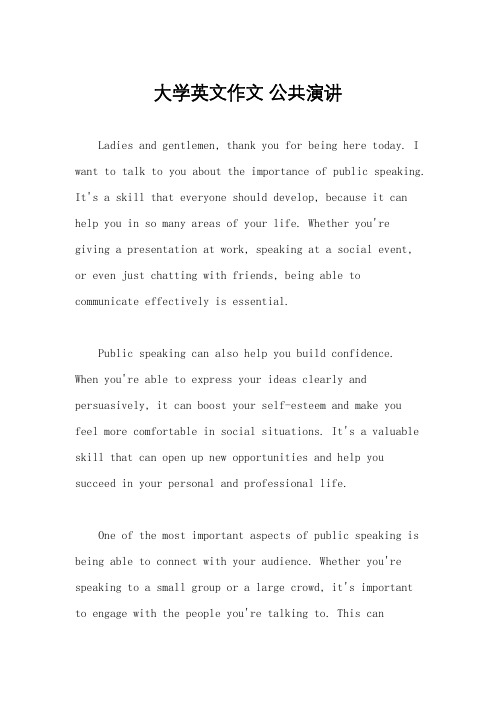
大学英文作文公共演讲Ladies and gentlemen, thank you for being here today. I want to talk to you about the importance of public speaking. It's a skill that everyone should develop, because it can help you in so many areas of your life. Whether you'regiving a presentation at work, speaking at a social event,or even just chatting with friends, being able to communicate effectively is essential.Public speaking can also help you build confidence. When you're able to express your ideas clearly and persuasively, it can boost your self-esteem and make youfeel more comfortable in social situations. It's a valuable skill that can open up new opportunities and help you succeed in your personal and professional life.One of the most important aspects of public speaking is being able to connect with your audience. Whether you're speaking to a small group or a large crowd, it's importantto engage with the people you're talking to. This caninvolve making eye contact, using gestures, and speaking in a conversational tone. When you're able to connect with your audience, it makes your message more powerful and memorable.Another important aspect of public speaking is being able to organize your thoughts and present them in a clear and coherent manner. This involves structuring your speech or presentation in a way that makes it easy for your audience to follow along and understand your main points. It's important to use transitions and signposts to guide your audience through your speech, so they can easilyfollow your train of thought.In addition to organizing your thoughts, it's also important to be able to adapt to different speaking situations. Whether you're speaking in a formal setting, a casual setting, or to an audience with different cultural backgrounds, it's important to be able to adjust your speaking style to fit the situation. This might involve using different language, adjusting your body language, or tailoring your message to resonate with your audience.In conclusion, public speaking is a valuable skill that can benefit you in many areas of your life. It can help you build confidence, connect with others, and communicate your ideas effectively. By developing your public speaking skills, you can open up new opportunities and become a more persuasive and influential communicator. Thank you for listening.。
- 1、下载文档前请自行甄别文档内容的完整性,平台不提供额外的编辑、内容补充、找答案等附加服务。
- 2、"仅部分预览"的文档,不可在线预览部分如存在完整性等问题,可反馈申请退款(可完整预览的文档不适用该条件!)。
- 3、如文档侵犯您的权益,请联系客服反馈,我们会尽快为您处理(人工客服工作时间:9:00-18:30)。
Structure
Introduction (the greetings, the presentation of
the problem, the definition of the problem.)
Body
(the opposing views, the refutation, the evidence,
They are impromptu[ɪm'prɒmptju:] speeches, extemporaneous[eks'tempə'reɪnɪəs] speeches, speeches from reciting, speeches from manuscript, but many of the speeches are written to be spoken before an audience.
Abstract nouns
declaration(declare), emancipation(emancipate), proclamation(proclaim), obligation(oblige), commitment(commit), aggression(aggress), ignorance(ignore)
Phonological device—alliteration
1. we refuse to believe that the 8. a story of a slave-holding
bank of justice is bankrupt
society
2. the dark and desolate valley 9. blood or birth
may be used in other variety First person pronouns Avoidance of non-standard words and expression
Hard words
Items I Have a Dream The Inaugural Address Total
The English of Public Speaking
侯玥 西语小教 2012062004
CONTECT
Introduction Features of speech Summary
Phonological Features Lexical Features Syntactic/Grammatical Features Semantic Features
examples, etc.)
Conclusion
(the speaker's view, appeal to action,
closing remarks, etc.)
Types of public speeches
The informative speech The persuasive speech The entertaining speech The stimulating speech
Purpose
To inform To persuade To entertain To impress
Ways of delivery
=Reading from a manuscript Reciting from memory Impromptu speaking Extemporaneous speaking
Hard Words Percentage
157 9.6%
139 8.8%
296 9. 2%
Total word numbers
1,637
1,576
3,213
Eg: demonstration, emancipation, proclamation, dramatize, declaration, independence, commitment, principle, ignorance, courageous, momentum, enterprise
There are also speeches on special occasions
Definition
Public speeches are delivered orally, but they are also often well prepared in writing and delivered on formal occasions.
12. the power to prevent
13.ห้องสมุดไป่ตู้make no mistake
7. land of liberty
14. favors freedom
15. the pain of poverty
Lexical Features
The employment of big words The employment of noun phrases where verb phrases
Martin Luther King
---I Have a Dream
Phonological Features
Skillful use and control of voice, pitch, pause, tempo
Phonetic figures of speech speed Rhythm Contract
3. seek to satisfy
4. dignity and discipline
5. trials and tribulations
6. the difficulties of today and tomorrow
10. defending common dangers
11. Social Security
Introduction
Definition Structure Types Purpose Ways of delivery
Definition
Public speeches are speeches delivered in public for a special purpose
